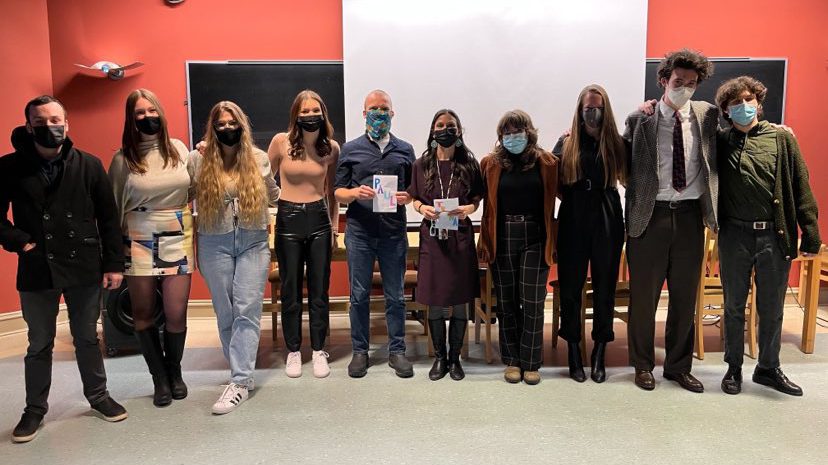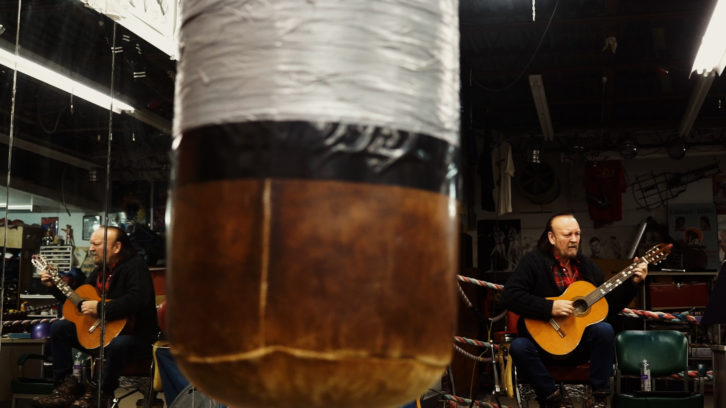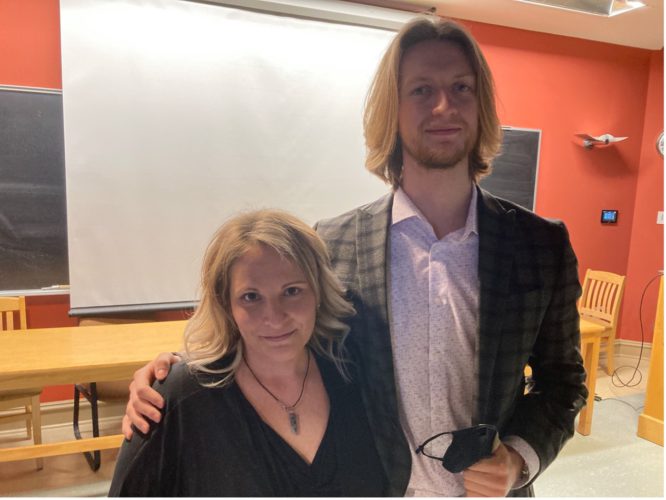J-school grads go big
King’s journalism students show off their work for first time post-lockdown

caption
Students and instructors in the video documentary workshop pose after the screening of their documentaries.Documentaries, podcast episodes and investigative research were all on display at the University of King’s College Big Day celebration, where graduating journalism students presented their capstone projects.
The School of Journalism has held public screenings of its audio, video and investigative workshop pieces for ten years, but the event has gone online for the past two years due to public health restrictions.
The school was finally able to hold an in-person Big Day on March 25.
Journalism school director Tim Currie told The Signal it feels “fantastic” to be face-to-face with students on Big Day after so much time away. Currie added he was eager to see what the students were doing as they approached graduation.
“You know that all this great journalism is going on in the various rooms, but that’s the irony is that everyone is working in isolation,” he said. “Two groups are downstairs, another group is up on the third floor, and you often don’t get a chance to really see what the students are doing.”
Fourth-year students Adam Inniss and Lane Harrison participated in the advanced video workshop, which they said was more than just a learning experience.
“The filming is just so fun,” Harrison said prior to the event. “It’s funny, because when you’re filming, you think everything is going to be great. Then when you go back to that group and you watch all the shots back that some of the shots aren’t as great as you thought.”
“But a lot of them are still great,” Inniss interjected.
“Yes, a lot of them are great and a lot of them are better than you thought,” Harrison said.
Harrison and Inniss collaborated on a documentary about Richard MacDonald – a Halifax boxing coach with a colourful history and a passion for acoustic guitar.

caption
Richard MacDonald performs in his boxing gym. He was featured in a documentary by King’s College students Lane Harrison and Adam Innis.The pair said working as a team made filming even more fun, and taught them about “cooperation, communication, collaboration – the three Cs of filmmaking,” as Inniss put it.
But collaboration on some of the other final-year projects was no laughing matter. The investigative journalism workshop required each small group to work on a different investigation with several major-league publications, including the Toronto Star. Students were sworn to secrecy about their investigations due to the gravity of the stakes involved.
Elizabeth Foster said the investigation had a big effect on her.
“I just kind of realized this investigation really impacts everyday life and it really made me see a lot of different things in a lot of different ways, which was cool,” she said.
Foster added that keeping the research to herself was a challenge.
“We jumped in to the very later stages of the investigative project on – redacted,” Foster said, miming a censor bar over her mouth with a laugh. “I keep finding myself almost saying it and I’m freaking out.”
Students in the video workshop had six weeks to devise, shoot and edit an original documentary, which they presented to an audience that included students and some of the people profiled in the projects.
Cam Towner’s documentary A New Path zeroed in on Carly Doyle, a Mi’kmaw woman who was forced to reckon with her career and identity as a police officer after 2020’s Black Lives Matter protests.
Doyle, who attended Big Day, said speaking with Towner about her extremely personal experiences ended up being easy – the student reminded her of her university-aged son.

caption
Cam Towner and Carly Doyle pose for a photo after the video documentary presentations.Towner said he shared Doyle’s enthusiasm for the filming process.
“My favorite part was honestly just getting to spend time with Carly, an incredible person, and an incredible character and so full of stories that I could not fit into seven minutes,” Towner said.
“So much hit the cutting room floor that I want to put back in.”
The head of the journalism school said interaction between journalists and sources is one of the most important and exciting parts of Big Day.
“That’s really where, to use a cliché, that rubber meets the road, right?” said Currie. “When you have the people you are reporting on right in front of you and you get to hear what did they think of what you did.”
By contrast, Big Day’s advanced audio workshop presentations painted extremely vivid pictures of their subjects without any visuals at all. Students who took the audio route had to write, record and mix a radio documentary or a podcast episode.
Maryanne McLarty’s special was about the folkloric background of fairies in Nova Scotia, and the modern-day fairy believers who dedicate their careers to fairy doors and fairy-oriented fortune telling.
McLarty said audio was a great medium for a story about a mythical creature because it leaves a lot to the imagination.
“No one has ever seen a fairy and nobody really knows what they look like,” she said, “so I thought that talking about them and not showing them would be a fun way to explore them.”
Wilson Atkins produced a series of podcast episodes that revolved around friendship, and what happens when a friendship ends. They said the audio format brought a layer of intimacy to the topic.
“I think that like telling a personal story about friendship – I kind of like not being able to see their face,” they said. “I like just hearing it. In my ears, it feels more personal.”
Currie said the diversity of topics was especially impressive.
“I’m always amazed at how everyone can find people doing different things – and so much of it isn’t obvious.”
Documentaries screened during the presentations for the video workshop touched on a wide range of subjects. One group focused on how a Ukrainian Dalhousie student dealt with crisis in her home country. Another team profiled a paramedic who has turned to pottery to help manage her mental health struggles.
Currie said seeing the progress students have made over the course of their degrees makes the projects all the more commendable.
“It’s great to be able to actually see what everyone is working on and listen to it and really grasp, how far students have come in the past year … and see what all that learning has resulted in,” he said.
About the author
Dylan Taylor
Dylan Taylor makes music, journalism and music journalism in Halifax, Nova Scotia.
